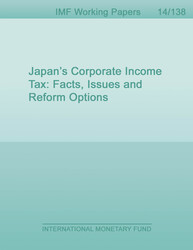
Japan’s Corporate Income Tax: Facts, Issues and Reform Options
This paper explores how corporate income tax reform can help Japan increase investment and boost potential growth. Using international and Japan-specific empirical estimates of corporate tax elasticities, investment is predicted to expand by around 0.4 percent for each point of rate reduction. International consensus estimates suggest further that between 10 and 30 percent of the static revenue loss could be recovered in the long run through dynamic scoring, although Japan's offset may be closer to the lower bound. Compensating fiscal measures are necessary in light of Japan's tight fiscal constraints. The scope for base broadening in the corporate income tax is found to be limited and some forms of base broadening will undo positive investment effects of a rate cut. Alternative revenue sources include higher consumption and property taxes. A gradual approach toward lowering tax rates mitigates windfall gains and reduces short-run revenue costs. An incremental allowance-for-corporate-equity system could boost investment with limited fiscal costs in the short run.
Publication date: August 2014
ISBN: 9781498300094
$18.00
Add to Cart by clicking price of the language and format you'd like to purchase
Available Languages and Formats
| English |
Prices in red indicate formats that are not yet available but are forthcoming.
Topics covered in this book
This title contains information about the following subjects.
Click on a subject if you would like to see other titles with the same subjects.
Economics- Macroeconomics , Economics / General , International - Economics , Corporate income tax , Japan , Tax distortions , Investment , Dynamic scoring
Summary
Copyright © 2010 - 2024
Powered by:
AIDC



